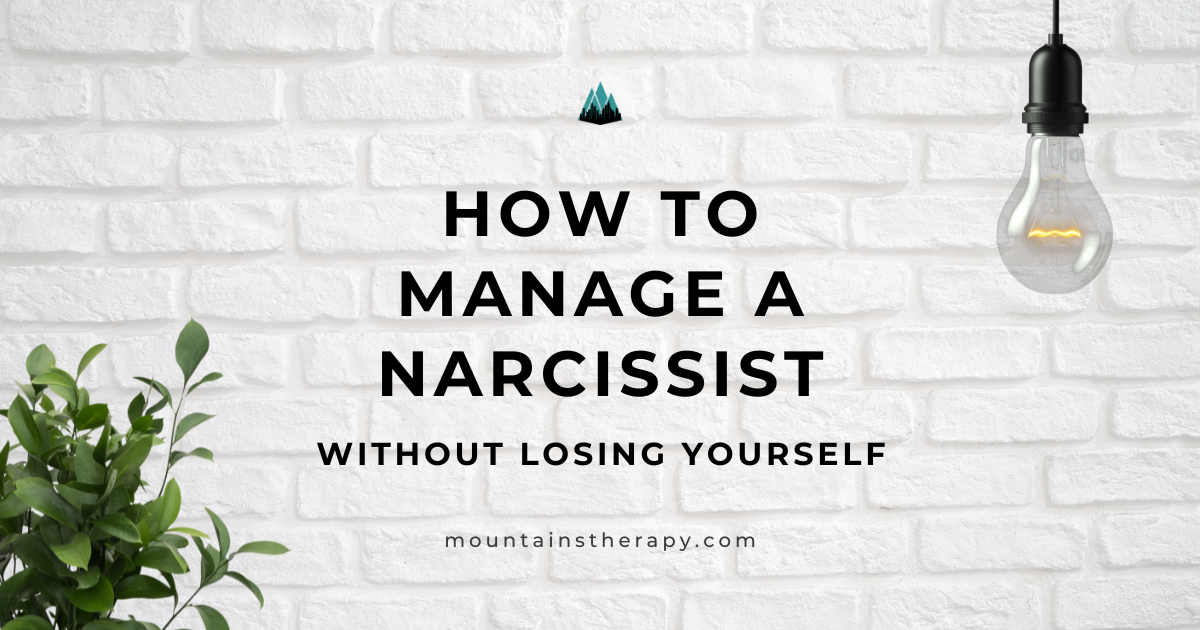How to Manage a Narcissist Without Losing Yourself
Learn more about Individual Therapy and NPD Therapy.
In This Blog, You’ll Learn:
✅ The difference between Narcissistic Personality Disorder (NPD) and narcissistic traits
✅ How Individual Therapy can help you navigate relationships with narcissists
✅ Key signs of narcissistic behavior and how to recognize manipulation
✅ Practical strategies for setting boundaries with narcissists in different relationships
✅ Ways to protect your mental and emotional well-being
If you’re constantly second-guessing yourself around someone, whether it's a narcissist partner, parent, sibling, friend, or coworker, you’re not alone. If you ask yourself how do I deal with a narcissist, we can help. Narcissists can be emotionally exhausting, making every interaction feel like a battle. But here’s the good news: You can learn how to manage them without letting them drain you. At Mountains Therapy, we’ve been voted best therapy, and our team is here to help. Whether you’re searching for the best therapist Montclair NJ, the best therapy near me, or the best counselor near me, we’ll guide you with strategies to protect your peace.
Narcissistic Personality Disorder (NPD) vs. Narcissistic Traits
Not everyone with self-centered behavior has Narcissistic Personality Disorder (NPD). There’s a difference between someone with narcissistic traits and someone with a clinical diagnosis of NPD.
Narcissistic Traits (Common, but Not a Disorder)
- Occasionally self-centered or egotistical
- Can show empathy in certain situations
- May exaggerate achievements but still recognize others’ feelings
- Can take responsibility when confronted with their behavior
- Might act selfishly but can maintain meaningful relationships
Narcissistic Personality Disorder (NPD) (A Clinical Diagnosis)
- Consistently lacks empathy and manipulates others for personal gain
- Sees themselves as superior and dismisses other perspectives
- Blames others for their problems and rarely takes responsibility
- Requires excessive admiration and reacts negatively to criticism
- Has unstable relationships due to control, manipulation, or emotional abuse
If someone in your life occasionally acts selfishly or seeks attention, they might just have narcissistic traits. But if they consistently manipulate, gaslight, or devalue you, they may have NPD, making it crucial to learn how to manage your interactions with them.
Understanding Narcissistic Behavior
Narcissists aren’t just arrogant or self-absorbed. Example of narcissistic behavior in a relationship:
- Twist reality to make themselves the victim
- Dismiss your emotions or gaslight you into questioning reality
- Seek control through guilt, manipulation, or intimidation
- React aggressively when they don’t get their way
Some are overt narcissists (loud, dominating, attention-seeking), while covert narcissists are more subtle (passive-aggressive, guilt-tripping, playing the victim). Either way, learning how to manage a narcissist starts with recognizing the patterns.
How to Manage a Narcissist in Your Life
How to Deal with a Narcissist Parent
- Set firm emotional boundaries. Your parent may try to guilt-trip or control you, but you don’t have to play along.
- Limit the information you share. Keep personal details private to avoid manipulation.
- Detach from their expectations. You are not responsible for making them happy.
How to Deal with a Narcissist Partner
- Stop trying to change them. They will not suddenly become more self-aware or empathetic.
- Use the “gray rock” method. Keep your responses neutral to avoid giving them emotional fuel.
- Have an exit plan if needed. If the relationship is toxic, know when to walk away.
How to Manage a Narcissist Brother or Sister
- Refuse to engage in sibling rivalry. Don’t compete for attention or approval.
- Set clear limits on their behavior. If they’re manipulative or critical, call it out or step away.
- Protect your peace. You don’t have to attend every argument they invite you to.
How to Manage a Narcissist Boyfriend or Girlfriend
- Recognize love-bombing. If they were overly charming at first and now criticize you, that’s manipulation.
- Hold your boundaries even if they get upset. They may try to guilt you into compliance—don’t fall for it.
- Trust your instincts. If you constantly feel drained, it may not be a healthy relationship.
How to Manage a Narcissist Spouse
- Stop explaining yourself. Narcissists love to twist your words—keep your responses short and clear.
- Don’t let their moods control your day. Their ups and downs are theirs to manage, not yours.
- Seek professional support. Therapy can help you regain your confidence and set boundaries.
How to Manage a Narcissist Friend
- Keep conversations balanced. If they only talk about themselves, redirect the conversation.
- Don’t expect emotional support. Narcissists struggle with empathy, so manage your expectations.
- Decide if the friendship is worth it. If they constantly drain you, it may be time to walk away.
How to Manage a Covert Narcissist
- Spot the subtle manipulation. They might act like the victim or use passive-aggressiveness to guilt you.
- Stay emotionally detached. Don’t fall into their pity traps—focus on facts, not emotions.
- Keep your self-esteem intact. They may undermine your confidence—don’t let them.
How to Handle a Narcissist Husband
- Don’t take the blame for his actions. Narcissists rarely take responsibility, but that’s their issue.
- Set boundaries and follow through. If he disrespects them, enforce consequences.
- Prioritize your well-being. If he refuses to change, consider what’s best for you.
How to Manage a Narcissist Wife
- Stop seeking validation from her. A narcissist thrives on making you feel unworthy—don’t play along.
- Stay firm in your decisions. She may use emotional manipulation to get her way—don’t back down.
- Seek outside support. A therapist can help you navigate the relationship in a way that protects your mental health.
How to Survive Living with a Narcissist
Living with a narcissist and how to talk with a narcissist can be emotionally draining, but you can protect yourself by:
- Setting Firm Boundaries: Make clear what behavior you will and won’t tolerate. Stick to these limits.
- Avoiding Power Struggles: Narcissists thrive on control and conflict. Don’t engage in unnecessary arguments.
- Practicing Emotional Detachment: Don’t take their behavior personally; it’s about them, not you.
- Prioritizing Self-Care: Maintain hobbies, friendships, and activities that bring you joy.
- Seeking Support: Therapy, support groups, or trusted friends can help you process your emotions.
- Planning for the Future: If the relationship is unhealthy, consider long-term options for change or separation.
How Do I Stop Being Narcissistic? / How to Stop Being Narcissistic?
If you’re concerned about narcissistic traits in yourself, self-awareness is the first step. Here’s how you can work toward change:
- Acknowledge the Behavior: Accept that narcissistic tendencies may be affecting your relationships.
- Develop Empathy: Practice active listening and consider others’ feelings and perspectives.
- Challenge Your Need for Validation: Learn to find internal fulfillment instead of relying on admiration from others.
- Take Responsibility: Own up to mistakes and be open to constructive criticism.
- Improve Emotional Regulation: Work on managing frustration and reactions without defensiveness.
- Seek Therapy: A mental health professional can help address deep-rooted patterns and guide personal growth. Change takes time, but with self-reflection and effort, it's possible to improve how you relate to others.
You Deserve Healthy Relationships
Dealing with a narcissist is exhausting, but you are not powerless. Setting boundaries, protecting your energy, and seeking professional support can help you regain control. At Mountains Therapy in Montclair, NJ, we’ve been voted best therapist, and we’re here to support you. If you’re searching for the best counseling near me or the best therapist near me, you’ve come to the right place. Take the first step toward emotional freedom. Schedule a session today. Your well-being matters.
Common Questions and Answers for How to Deal with Narcissists
- My narcissistic parents how to deal?
- Recognize manipulation and set clear boundaries.
- Maintain emotional and financial independence.
- Limit contact if their behavior is toxic.
- How to deal with a narcissistic mom?
- Set firm boundaries and limit emotional engagement.
- Avoid seeking validation; focus on your well-being.
- Seek therapy or support groups for guidance.
- How to deal with a narcissistic father?
- Stay calm and avoid power struggles.
- Don’t expect accountability; focus on yourself.
- Reduce interactions if needed for mental health.
- How to confront narcissistic mother?
- Stay calm, be direct, and set boundaries.
- Stick to facts and avoid emotional reactions.
- Limit contact if confrontation turns manipulative.
- How to deal with a narcissist partner?
- Set clear boundaries and enforce them.
- Avoid emotional reactions; stay calm and assertive.
- Don’t expect change—focus on your well-being.
- How to deal with a narcissistic partner?
- Recognize manipulation and disengage from arguments.
- Prioritize self-care and emotional independence.
- Seek therapy or support groups for guidance.
- How to deal with narcissistic partner?
- Maintain firm boundaries and avoid gaslighting traps.
- Limit emotional investment in their approval.
- Consider distance if the relationship is toxic.
- How to cope with a narcissistic spouse?
- Accept that they may never change.
- Protect your mental health with self-care.
- Seek professional support if needed.
- How to Cope with a Narcissistic Husband:
- Set Boundaries: Clearly define what behaviors you will and won’t tolerate.
- Stay Calm: Don’t engage in arguments or emotional manipulation.
- Seek Support: Talk to a therapist or join a support group.
- Practice Self-Care: Prioritize your mental and emotional well-being.
- Limit Expectations: Accept that he may not change and focus on protecting your peace.
- Consider Distance: If the relationship is toxic, evaluate your options for separation or divorce.
- These steps can help you with how to cope with narcissistic husband.













